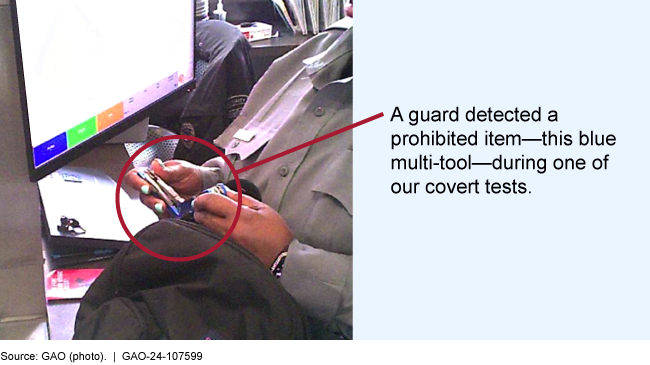Federal Facility Security: Preliminary Results Show That Challenges Remain in Guard Performance and Oversight
Fast Facts
Federal Protective Service's contracted guards control access to government facilities and screen visitors to detect prohibited items.
We testified that our investigators conducted 27 covert tests at certain federal buildings in early 2024, and the guards failed to detect prohibited items—like pepper spray and batons—in about half of them.
FPS is working to improve screening by increasing training and analyzing data to identify common causes of test failures.
Federal real property has been on our High Risk List since 2003, due partly to past attacks on federal buildings.
A Federal Protective Service Contract Guard Detects a Prohibited Item During Our Covert Screening

Highlights
What GAO Found
To secure federal facilities and protect employees and visitors, the Federal Protective Service (FPS) manages and oversees more than 13,000 contract guards, whose duties include controlling facility access and screening visitors to detect prohibited items. To determine if FPS was effectively protecting federal facilities, GAO investigators conducted 27 covert tests at 14 selected federal buildings in early 2024. During these tests, GAO investigators had a prohibited item—a baton, pepper spray, or a multi-purpose tool with a knife—inside a bag that they attempted to bring into the building. FPS contract guards failed to detect prohibited items in about half of GAO's tests.
FPS conducts its own covert tests, the results of which were consistent with GAO's tests. While FPS determined that the specifics of its testing program are law enforcement sensitive, FPS officials said they have several reform efforts underway to improve contract guards' detection of prohibited items. Those efforts include (1) redesigning the initial training course for contract guards, (2) increasing on-the-job training, and (3) collecting covert testing data to identify common causes of covert test failures.
Stakeholders identified data system challenges that undermine FPS's productivity and oversight of contract guards. FPS developed data systems to improve oversight of the contract guard workforce in response to previous GAO recommendations. The Post Tracking System, initially piloted in 2018, was expected to be the system of record for ensuring that every post was staffed by a qualified guard for the correct time frames, but it has yet to be fully implemented in any region. In addition, stakeholders said the system continues to face technology, data reliability, and interoperability challenges and has not delivered the promised capabilities. This negatively affects the productivity of FPS's oversight efforts, according to stakeholders. Some FPS officials also said they do not use the reports for billing the government because the data are inaccurate or incomplete. Consequently, even in areas that have deployed the system, FPS continues to use an old paper-based system for billing and oversight tasks.
Why GAO Did This Study
Federal real property has been on GAO's High-Risk List since 2003, in part due to threats to federal facilities. Past attacks on federal buildings demonstrate that the security of federal facilities remains a high-risk area. FPS, within the Department of Homeland Security, is responsible for protecting thousands of federal facilities. FPS employs contract guards at 2,500 federal facilities at a cost of almost $1.7 billion in fiscal year 2024.
This testimony discusses the preliminary results of an ongoing GAO review that focuses on (1) how effective FPS contract guards are at detecting prohibited items and FPS's efforts to improve detection, and (2) stakeholders' views on whether FPS data systems have improved oversight of the contract guard program.
To determine the effectiveness of FPS guards in detecting prohibited items, GAO conducted 27 covert tests at a nongeneralizable sample of 14 federal facilities and analyzed data from FPS's covert tests. To obtain stakeholders' views on FPS's data systems, GAO reviewed information on the systems and interviewed stakeholders, including FPS officials, federal tenants, guard unions, and security guard companies.
GAO provided a draft of this statement to FPS. FPS determined that some information was law enforcement sensitive. We withheld that information from this statement and incorporated other comments as appropriate. GAO plans to complete its work and issue a report on these issues by the end of the year.
For more information, contact David Marroni, Director, Physical Infrastructure, at (202) 512-2834 or MarroniD@gao.gov.
